 I love research, I hate research. Who’s with me on that one? But as authors we must able to create realistic worlds for our characters. And if you’re writing anything historical, you need to know what folks were saying back then.
I love research, I hate research. Who’s with me on that one? But as authors we must able to create realistic worlds for our characters. And if you’re writing anything historical, you need to know what folks were saying back then.
You wouldn’t use the word “head honcho” in a 1940s era novel; the term didn’t come about until the 1970s. You might still hear “be-bop,” that’s been around since the 40s. Shaun McLaughlin did an excellent IU guest post about Google Books Ngram Viewer.
Since I’m researching the WW II era for a historic romance novel, I needed to be savvy on some of the lingo that was used back then. So I did an internet search and typed in “American slang from the 1930s and 1940s.” I got a lot of junk on my return search, but one site caught my eye.
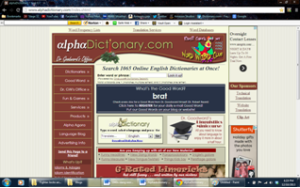 Alphadictionary.com came up with lists of slang words by era. You can type in a word, set your search parameters, and if you want a “clean” listing or not. The “full” listing will include any vulgar slang as well.
Alphadictionary.com came up with lists of slang words by era. You can type in a word, set your search parameters, and if you want a “clean” listing or not. The “full” listing will include any vulgar slang as well.
I searched “dance” and this is what I got:
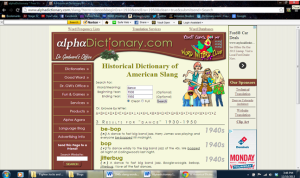 The only downfall of the site is you have to use full decades. So if you want to search something very specific, you can’t exactly do it. But, for the majority of us, just having the correct decade is okay. If you need a list of words commonly used in that era, just leave the word/meaning field empty. You will get a lengthy list.
The only downfall of the site is you have to use full decades. So if you want to search something very specific, you can’t exactly do it. But, for the majority of us, just having the correct decade is okay. If you need a list of words commonly used in that era, just leave the word/meaning field empty. You will get a lengthy list.
Alphadictionary also has the unique feature of having a Specialty Glossary. Oh, this is fun! They have glossaries of things like beer, wine, medical, golf, astronomy, cattle, law enforcement, you name it! These are great if you are writing a piece with a specific audience or genre in mind. Once you click on a subject, you will be taken to a page that has various glossaries in which to find just the right word.
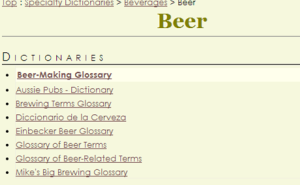 And if you get bored and just want to have some fun, they have a Fun & Games tab. Somewhere on the site I managed to find a Yankee vs. Rebel quiz. It led to a few chuckles.
And if you get bored and just want to have some fun, they have a Fun & Games tab. Somewhere on the site I managed to find a Yankee vs. Rebel quiz. It led to a few chuckles.
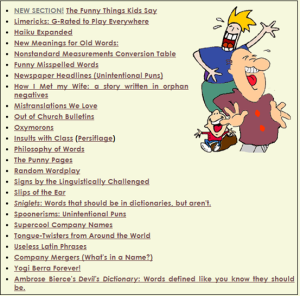 The site also offers foreign language dictionaries. You just click on the language and are sent to a page like the Specialty Glossary. There are several hundred languages and dialects you can search.
The site also offers foreign language dictionaries. You just click on the language and are sent to a page like the Specialty Glossary. There are several hundred languages and dialects you can search.
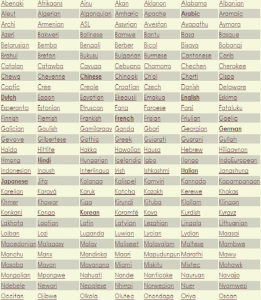 Overall, the site is pretty easy to navigate, and there are so many resources you can’t possibly use all of them in a lifetime. They boast that you can search 1065 online dictionaries at once. The site does offer “paid” services, but for the most part I think authors can get what they need on the free side.
Overall, the site is pretty easy to navigate, and there are so many resources you can’t possibly use all of them in a lifetime. They boast that you can search 1065 online dictionaries at once. The site does offer “paid” services, but for the most part I think authors can get what they need on the free side.
So if you are struggling with getting the right words for the right era, give Alphadictionary a try.

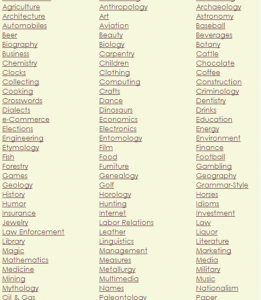
Does it cover the period from 20,300,214 years ago to around twenty years later than that? The society described being dolphins? Wouldn’t want to get my characters’ lingo wrong!
Ha ha. Don’t think the written language had any part way back then. But if it makes you feel any better- ack, aaaaaccccckkk, brrrippp, keeeek, awk, ziiiiiiiitttt, eeeeeeeeee!!!!
I can see you’re an expert. If Alphadictionary fails me, I’ll just call you.
*squeak* *snort* *cackle*– actually I speak dog better. LOL!
Thanks for the post, its always helpful to have another tool in the mix. I’ll have to check it out.
It can be a bit inundating at first. I’m still getting the hang of it. Have fun!
This looks interesting. Thanks.
All gifts gratefully received, thank you Kathy.
*bows humbly*
What a great site, and service. Thanks for telling us about this one Kathy.
Very cool. Thank you, Kathy!
Kathy,
Thanks for adding another arrow to my research quiver (and for the nod on Ngram Viewer). I will definitely use the alphadictionary.
Another tip. For a long list of early 19th century slang, cant and cuss words, check out the 1811 Dictionary of the Vulgar Tongue at Gutenberg: http://www.gutenberg.org/ebooks/5402